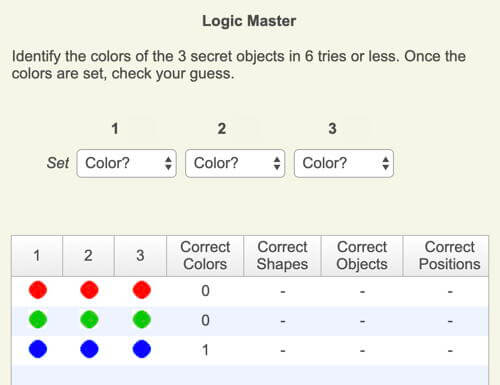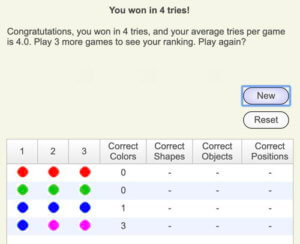Test Your Questioning Using Logic
Questions are requests for information directed toward someone, including yourself. But will your query receive the most useful information that you seek? Logic, which relies on using evidence in your thought process, provides one way to develop and test a question’s quality and usefulness before you ask it.
Interestingly, questions gather the initial information you need to build your logical questions. Useful starting queries are:
- What do I know?
- What do I need or want to know?
Logic is then applied to create the logical sequence of questions that need answering to go from what you know to what you want to know.
Games and Questioning
There is more to the three games in this section than winning. These three games provide nearly unlimited challenges to develop and test your questioning skills and provide feedback on your progress. In Logic Master, practice developing the most useful questions using logic. In the other two games, explore how questions help identify patterns and test if they are the solution. In Suzie the Artist find the repeating regularities within a series of numbers, and in the State of Hal, find them in letters or the geography of the 50 U.S. states.
Logical Reasoning: Logic Master
In Logic Master, identify the colors, shapes, and positions of the unknown objects in as few tries as possible. When you start a game, you know nothing about the secret objects. Design your questions so each guess gathers the vital information to build upon to solve the challenge. Strive to make each of your queries provide unambiguous data when possible.
There are 24 variations of the Logic Master game:
- Select either 3 or 4 objects,
- Select either 4 or 5 colors for the objects,
- Select either 1, 2, or 3 shapes for the objects, and
- Select if the position for each object must be identified or not.
Start with fewer variables to develop and fine-tune your questioning and logical reasoning. Add more complexity to test and expand your process.
Ages: 8 years old and up.
Click the blue/green button to play the app for desktops, laptops, and tablets.
Click the black/purple button to play the app for smartphones.
Acknowledgments
Many thanks to Lincoln Berkley, Xiomara Contreras, Mason Glidden, Mattea Horne, Elliot Kephart, and Corey Rost for sharing their valuable suggestions to improve the game.
How Well Did You Do?
Find out how your win compared to the winners who played before you online! The best score, average score, and average time to solve are saved for each of the 24 game levels, and since each game is randomly generated, you always have a unique challenge to beat!
Tip
What something isn’t is just as important as what something is. So queries that produce no correct colors, shapes, or positions provide rich information for designing the next guess.
More complex challenges often require more queries and resulting data to consider. Organize your data, especially what you know as true and incorrect, using a piece of paper and a pencil.
As an experiment, try a challenging level first using a paper and pencil to organize your findings, and then try it without.

Screenshot of the game, Logic Master. Use logical reasoning to find the secret pattern of colors, shapes, and positions in as few queries as possible.
There are 4 possible colors for the three objects above. What is the color pattern?
There are only four possible colors, red, green, blue, and magenta. Since the first two guesses indicate there is no red or green, and the third guess shows there is one blue circle. There must be two magenta circles.

Using Logic to Design the Next Question
1) What does the information tell me (both positive and negative)? Negative results provide critical data but are often avoided during our questioning (see an interesting activity and article on confirmation bias).
2) What do I know currently that helps me toward my goal?
3) What don’t I know currently that I need to discover to achieve my goal?
4) What do I need to know next that gets me closer to my goal? There may be more than one “next”.
5) What question provides the clearest data to work with? Part of designing this question depends on what feedback is possible.

0 Comments